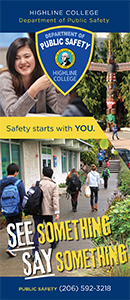Mass Transit Options
There are several options for commuting to campus– find the one that’s right for you!
Kent Des Moines Light Rail Station
The Kent Des Moines Link Light Rail station is open on right across Pacific Highway. This is one of three new stations planned to open in South King County. The station is part of the 1 Line, which terminates in Lynnwood and has various stops throughout Seattle.
For more information Kent Des Moines Station.
For information on Station Arrivals:
Bus Routes to Highline College
King County Metro provides public transit service to the college that includes on-campus bus stops. You can purchase bus fare with cash or with an ORCA card. To find out more about ORCA cards, visit the website at www.orcacard.com.
Bus Routes that serve Highline College are:
Green River College, Kent Station, Highline College (S. 240th St. and 26th Place – the horseshoe drive near Building 1), Normandy Park, Burien Transit Center.
Highline College (near Building 29), Des Moines, Sea-Tac Airport Station, Southcenter
The A Line has 50 stations and stops. A station near Highline College provides connections to buses serving Kent, Des Moines, and Burien. The S. 176th Street station near Sea-Tac International Airport provides connections to Link light rail and buses that serve Pierce County, Auburn, Kent, and Burien.
Find out more at the King County Metro Trip Planner website: tripplanner.kingcounty.gov
Commute Trip Reduction Program (CTR)
About the Commute Trip Reduction Program
Highline College participates in the statewide Commute Trip Reduction Law as mandated by the Washington Clean Air Act (RCW 70.94). State law requires Highline College, as a major employer, to reduce the number of trips and miles driven in single occupancy vehicles to and from campus. The purpose of the Commute Trip Reduction (CTR) program is to:
- help reduce traffic congestion;
- encourage the use of alternative methods of transportation;
- make the best use of existing parking facilities;
- reduce employees’ commuter stress
- reduce energy consumption; and
- reduce environmental pollution.
Commute Trip Reduction Coordinator
The Commute Trip Reduction Coordinator will provide transit and ride-sharing information, act as liaison between Highline College and King County Metro Bus System, assist ridership registration and carpooling for use on the campus, and administer the employee reimbursement program.
Francesca Fender is the Transportation Coordinator for Highline College. Questions regarding this program should be directed to the Transportation Coordinator at ffender@highline.edu or by telephone, (206) 592-3281.
Compressed Work Week
In accordance with Highline College policy an alternative work schedule would allow a full-time staff member to eliminate at least one work day every two weeks by working longer hours during the remaining days, resulting in fewer commute trips by the employee. This includes both weekly and biweekly arrangements, of which the most typical being four 10-hour days or 80 hours in nine days, but also may include other arrangements.
At Highline College, this procedure is, at present, limited to the period between the end of the spring quarter session and the start of the fall quarter session. Implementation will be contingent upon agreement between the staff member and his/her supervisor. (See details.)
Other Provisions
- Telecommuting alternatives may be appropriate as necessary
- Bicycle storage racks are located on the east side of Building 30, west side of Building 6, east and west side of Building 8, and east side of Building 25.
- Shower facilities are available in Building 27
- Paved pedestrian pathways with appropriate separation from vehicle pathways exist along the North Road and all parking lots
CTR Related Links


